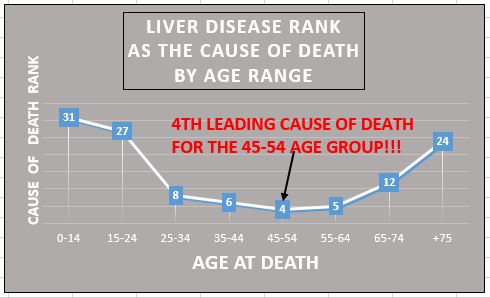You may think dying of liver disease is for old people. According to the CDC it is the 4th leading cause of death for the 45-54 year olds. In this analysis a low number is very bad. If you ignore poisoning (drug overdose), and suicide, it is the second leading cause exceeded only by its common partner heart disease. #kissandclick #kisseschallenge
We provide quite a bit of information about the silent killer that is liver disease but since the organ has few symptoms before it starts to die most people don't see themselves as being at risk. I am writing this in hopes that you might forward it to someone you care about that may not be aware of the risk that they face. We frequently hear from young people with families who are suddenly diagnosed with cirrhosis. That is a mostly preventable tragedy but understanding the risk is the first step.
I encourage you to share this with someone you know who might benefit from the information.
As you consider your health, it is important to understand that your doctor is unlikely to give you effective warning that you are in danger. There are frequently no symptoms of advancing disease and diagnosis is tricky without symptoms. Since medicine has no treatments to give you for most liver problems the rule is a fuzzy don't ask if you have no answers, so your course is to go blindly along until you face a terminal illness.
For you as a patient, knowledge is power. Diagnosis is illusive, but it is possible to analyze your routine blood tests and gain a sense of whether you should be seeking an in depth examination of your liver's health even though you have no symptoms. We do know a lot about the general characteristics and habits that go along with the disease. They don't tell us if you, as an individual, have a sick liver but they can guide you in asking questions of your doctor. Becoming aware before you become ill is vital.
We support a general liver health score screening as part of an awareness effort we sponsor with Amsety. It can help you understand those things that contribute to liver disease. Click this link if you would like to learn your score.
amsety.com/my-liver-health-...
Another tool deals with your routine blood tests and is called the FIB-4. It uses your age, AST, ALT, and platelet count and it can help you understand your risk of disease even if you don't have any symptoms. High results indicate that you should find out if you have liver scarring or NASH happening. We recommend that every adult calculate their score as part of preparing to discuss your health with your doctor. When considered with the rest of your medical record it can assist your physician in coordinating the analysis of your health status. You can click the link below for an online calculator.
hepatitisc.uw.edu/page/clin...
We will examine other tools in the future but we recommend that you take these steps now even if you already know you have a problem. Understanding your situation is the key to dealing with the disease and you can't assume that the medical profession is going to be proactive about catching an advancing liver problem early. Liver disease is not one of the things that we routinely screen for even though it is an important killer of young adults. The exception is hepatitis C. If you haven't been tested for that you should be.
